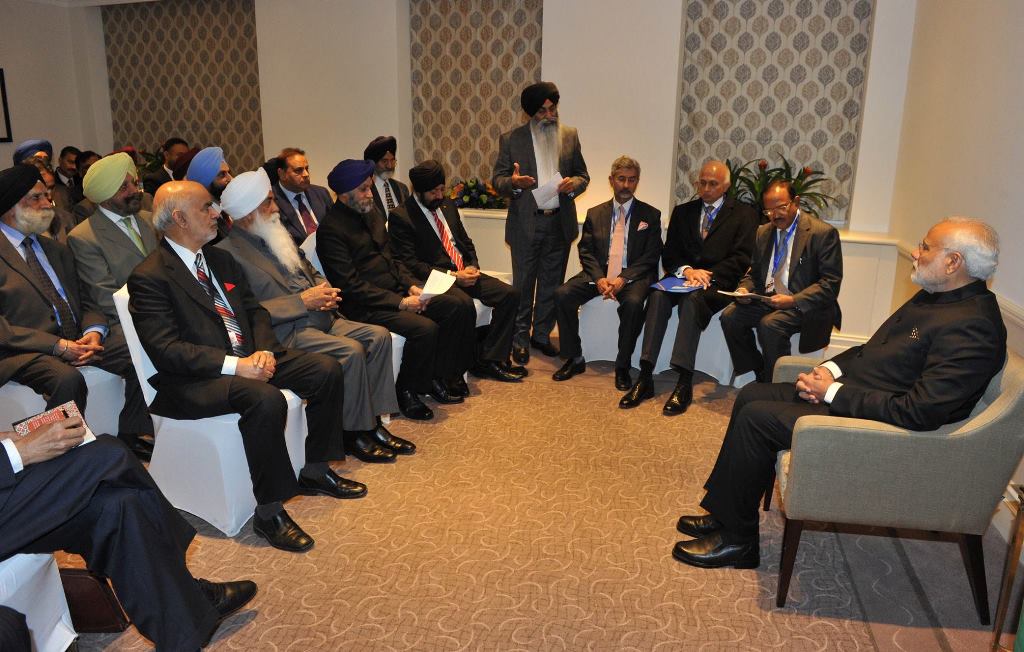After Thursday’s historic referendum, the UK has voted to leave the European Union with the ‘leave’ camp scraping a majority of 51.9%. David Cameron has since announced his resignation as PM with former London Mayor Boris Johnson the favourite to replace him. The ‘remain’ camp accounted for 48.1% of the vote, with Northern Ireland, Scotland, and London all voting heavily in favour to remain. Turn out was at 72.2%, the highest since 1992. Brexit has already caused the British economy to suffer, with the value of Sterling falling to levels not seen since 1985 and many international organisations such as the IMF are predicting that the UK will again fall into recession. As a Sikh, it is important to take stock of these happenings before considering how they might effect our community and wider society.
The last few months created the most polarising political storm of our lifetimes. The debate over EU membership devolved into each side mudslinging instead of providing compelling arguments. It did not help that Britain’s far-right parties were allowed substantial media coverage to spread their message of hate disguised as taking control of ‘our country’. The assassination of Jo Cox MP by a far-right, white terrorist did not help the atmosphere. Though the vote was split closely, the British public must now live with its decision. The Government must find a way to leave the EU, but also appease the considerable minority who voted to remain. But little will happen until October when a new leader of the Conservative Party is chosen. In the time between now and then, Conservative MPs will nominate two candidates; a postal vote will then take place between all Conservative party members to decide who will be their new leader from the two candidates. Essentially, this means that 0.02% of the UK population will be voting for the new Prime Minister.
Ignoring the political show, the key reasons people voted to leave the EU were as follows:
- The bureaucracy of the EU was undermining the sovereignty of the UK;
- Immigrants are taking jobs away from British citizens, they are causing overcrowding, and making Britain lose its identity;
- Being in the EU means the UK had little to no control of its borders;
- Brexit would allow the UK to make its own laws without restrictions.
and,
The main motives to have remained a member of the EU were as follows:
- Leaving the EU would negatively impact the UK economy for years to come;
- The EU allows for a pooling of experts in all industries such as science, research and decision-making processes, for example, EU migrants in the UK help fill the shortage of doctors in the UK;
- Being a member of the EU provides Britain with more jobs and opportunities, lower prices, better workers rights and better national security;
- The EU provides funding for projects inside the UK, for example Wales is a net beneficiary of EU subsidies;
and,
So what’s the confusion? Those who believed the EU to be an unfair system will soon realise that when we continue to trade with member states, we will need to implement certain legislations, much like being a member of the EU. For example, to have access to the EU single market, the UK will also need to allow the free movement of people, much like Norway. The effect on the economy is already evident in the hours since, but many experts have forecast that we will also see an effect on mortgages, wages, house prices, benefits, taxes, pensions, holidays and travel, cost of living, food and drink, investments and savings and mobile phones – Brexit is going to impact the lives of all Britains.
There have been numerous facts and misinformed ‘facts’ flying around during the campaign. One such example being the amount of money Britain sends to the EU, with the ‘leave’ campaign suggesting that the UK will regain £350m per week sent to the EU, which will be reallocated to the NHS if Britain was to leave. Closer examination shows that this was an outright lie as this was not the net figure since it failed to account for tax rebates and other financial benefits which Britain receives, meaning an exact figure is difficult to calculate. This pledge was pivotal to the ‘leave’ campaign, but only an hour after the result, it was being disowned by the far-right parties. Furthermore, the idea of Britain not being able to make its own decisions is a fabrication too; the truth is that in terms of the total volume of laws passed, the proportion of times the UK Government has been on the ‘losing side’ is the shockingly small percentage of 2% since 1999. The idea that the general public will have more of a say following a departure from the EU is also a myth, seeing as MEPs are democratically elected just like MPs.
Too many ‘leave’ campaigners have whipped up xenophobia around immigration and used it as a tool of fear. It is easy to blame immigration for the failing NHS; it shifts responsibility away from the Government (who need to tackle this problem as an infrastructural issue). The ‘leave’ camp has also heavily pushed the idea that ‘our jobs’ are being taken by ‘non-natives’, and also seem to be conflating the refugee crisis with immigration, the ‘Breaking Point’ poster a case in point. There are studies showing that EU migration not only boosts the economy, but is necessary due to Britain’s ageing population, meaning that Britain needs migrants to do the jobs that Britons themselves don’t want. In the midst of all this, it seems as if the public has forgotten about the banking crisis of 2008 which is still affecting the lives of the UK public. The bankers were not held responsible, and as such immigrants have taken the blame for the shortcomings of the UK’s economy. The immigrant issue should be straight-forward to the global and far-reaching Sikh community. We are still immigrants or children of immigrants; voting to leave will never change that fact.
So what does the future hold for Britain? No country has left the EU in recent history, therefore the effects of leaving are largely unknown. Challenges will include investing in industries that are already committed to the EU, such as EU Accounting Directives that were implemented into UK Company law in 2006, lawyers that have studied and work with EU law, and warnings that Brexit will restrict the movement of UK students who want the opportunity to take part in Erasmus exchange programmes. And what of the varying results in differing parts of the UK? Scotland, Ireland and London strongly voted to remain in the EU and there is now mounting pressure in Scotland for a second referendum for it to leave the UK. This time it seems extremely likely that Scots will vote for independence. And there have even been talks of a ‘United Ireland’ being formed. Thus it is a real possibility that Brexit will lead to a split UK.
So what is this Sikh’s perspective on all of this?
Our sovereignty exists in our ability to work at the highest levels whilst maintaining the principles of our way of life. If those levels are corrupt then we will oppose them, just like we did with the British Empire and then the Indian state. However, those who want to leave the EU have been justifying it on the basis of elective decision-making; for Sikhs we know first-hand the importance of inclusivity with policy-making. Our political institution of Sarbat Khalsa is based on collective decision making, no matter how long it takes. We’re also dedicated to being pluralistic and global, ending our daily Ardas with ‘Sarbat da bhalla’ – our salute to working together to achieve common goals. Put simply, we can work within any political system and still find our ideological feet. This change in political climate means we must be more alert and intelligent; we will need to make more of an effort to keep a global world view.






